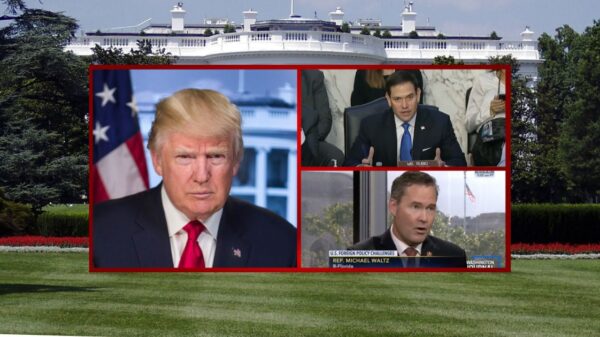Freshman U.S. Rep. Mike Waltz, R-Fla., who sits on the U.S. House Armed Services Committee, used that position to press the Pentagon on its plans to base U.S. Space Command and on current terrorist threats.
Earlier this month, Waltz, the first Green Beret to serve in Congress, introduced a proposal to have the White House and U.S. Defense Department create the United States Space Command “as a unified combatant command and repeal a conflicting directive in law for a subordinate command.” Waltz has also joined with U.S. Rep. Bill Posey, R-Fla., to have Space Command based in Florida.
On Tuesday, during a committee meeting on the Fiscal Year 2020 National Defense Authorization Budget Request, Waltz asked Acting U.S. Defense Sec. Patrick Shanahan about plans for Space Command.
“I want to talk to you a moment about space,” Waltz said. “Russia and China have weaponized space. They have done so. They are in the process of doing so, and they explicitly in their national security strategy seek to dominate the United States in space. They are prepared for war, and in my opinion, we are not. So with the flip of a switch China can track, they can dazzle, they can destroy our assets in space. In 2018, China conducted more space launches than any other–than any other country in the world. Why does this matter? I think as leaders we need to help Americans understand that our entire modern way of life is dependent on space now. Our navigation, our supply chain, our banking, how we communicate. The Space Foundation says over $400 billion of our economy is now dependent on space. Yet in the Pentagon, our various components for warfighting in that domain are all over the place.
“GAO estimated we have over 60 [federal] stakeholders involved in this organization. In terms of acquisition oversight in the Air Force is 11 different parts. I personally believe we are with space where we were in the 1940s with the Air Force where it had to be split off from the Air Corps for all kinds of reasons that are now obvious,” Waltz continued. “I have introduced legislation that cleans up some past legislation in terms of making it a fully unified command versus the subordinate command. I would encourage my colleagues to support me in that.
“Bottom line, gentlemen, and I’ll go with you, Mr. Secretary, are we prepared? Are you confident that we could win a conflict in space today if we had to do so?” Waltz asked.
“I’m fully confident we could win a conflict in space today,” Shanahan replied.
“Without the current budget trajectory, for example, if we had to go to a continuing resolution, are you confident that we could win in space in the next five to ten years given the Chinese investments?” Waltz asked.
“We just don’t need to take that risk. I mean this is really about–we have a $19 trillion economy that runs on space. We need–that’s why the–a CR would be so painful. We’ve put a plan in place. The three percent to five percent growth — real growth that we need allows us to even go faster, but it’s vital that we get that top line,” Shanahan answered.
“Mr. Secretary, have you made a decision on where the new U.S. Space Command will be located?” Waltz asked. “There is reporting in the press that it will be in Colorado and that there’s been a nomination.”
“Yeah, no, there’s–there’s—” Shanahan said.
“I would submit to you space is in Florida’s DNA,” Waltz interjected.
“And to strongly consider Florida as you move forward with that decision,” Waltz said.
At the same committee meeting on Tuesday, Waltz asked Chairman of the Joint Chiefs of Staff Gen. Joseph Dunford about “the Taliban’s capabilities to hold off Al Qaeda from finding safe haven in Afghanistan.” Waltz has stated his opposition to a peace deal with the Taliban, noting that there are more than 20 terrorist organizations on the Afghanistan-Pakistan border which the Tablian cannot and will not rein in.
“I would just submit to you that–and I’m concerned in hearing testimony across the board from across the services. I understand where we’re going with the National Defense Strategy. I think that’s the right place, the right thing to do in terms of reinvesting in our technological superiority. However, we cannot do what we did in the 1980s post-Vietnam and flush those lessons, those counterinsurgency, those counterterrorism lessons down the tubes. Gentlemen, General Dunford, do you believe ISIS is defeated as a military organization?” Waltz asked.
“ISIS maintains global capability, Congressman, so while they’ve been clear to the ground in Syria, in Iraq it remains a threat,” Dunford said.
“Do you believe Al Qaeda is defeated?” Waltz asked.
“No, I don’t, Congressman,” Dunford replied.
“Do you believe that in your military advice that the Taliban–forget their political will, that they have the military capability to deny Al Qaeda use of Afghanistan, and particularly military capability that a 300,000-man Afghan Army and a coalition of the most powerful Western armies in the world have struggled to do in 18 years, and I’ve certainly participated in and I know you have as well? Do you believe the Taliban have that capability if we bought into the fact that they desire to do so?” Waltz said.
“Congressman, I’m not–I’m not pushing back on your question, but it’s hard for me to imagine having a conversation about the Taliban fighting Al Qaeda given how close they are as organizations right now, ” Dunford answered.
“Right,100 percent agree,” Waltz said. “First we have to get over do we buy they have the will to deny Al Qaeda Afghanistan as a launching pad into back in the United States. Then we have to look at what’s their enforcement mechanism, what’s their capability.
“Gentlemen, just with the time I have remaining, I’m glad that you touched on the fact that if we had to go to a national emergency today from a recruiting standpoint 75 percent of young people couldn’t serve in the military. That’s why I’m pushing for–to go–for us to go back to National Service. That’s not a draft, that’s national service, as a means to prepare our young people to serve in all types of capacities, and look forward to working with you in that regard,” Waltz added. “Thank you.”
Kevin Derby can be reached at Kevin.Derby@floridadaily.com.




















